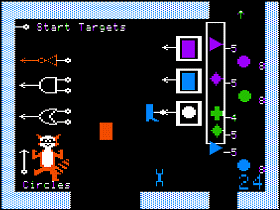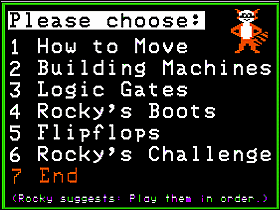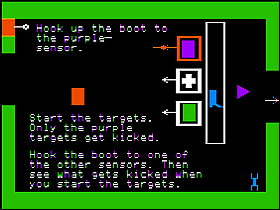 The Game: Rocky is trying to build machines to kick stuff. He provides players with a number of connectors and components, and shows them how they can be used to achieve different tasks. (The Learning Company, 1982)
The Game: Rocky is trying to build machines to kick stuff. He provides players with a number of connectors and components, and shows them how they can be used to achieve different tasks. (The Learning Company, 1982)
Memories: Fresh from leaving Atari and then taking a vacation, game designer and programmer Warren Robinett was ready to get back into the game, literally. But he had languished in anonymity at Atari as one of the last holdouts at a time when many of the company’s original pool of programming talent was defecting to Activision and Imagic; when Robinett returned to game making, he’d do it on his own terms.
 Robinett signed up with an software outfit called The Learning Company. Educational games remained a bugbear of both the console and computer industries; try as they might, few games in this category stood out as compelling games or useful educational tools – one of the two requirements always fell short. Could an Atari veteran – with a major hit game called Adventure under his belt, no less – change the status quo?
Robinett signed up with an software outfit called The Learning Company. Educational games remained a bugbear of both the console and computer industries; try as they might, few games in this category stood out as compelling games or useful educational tools – one of the two requirements always fell short. Could an Atari veteran – with a major hit game called Adventure under his belt, no less – change the status quo?
The answer: perhaps not. People still talk about Adventure – a lot. Rocky’s Boots is a bit more obscure (but it is remembered – not a privlege shared by many edutainment titles). Rocky’s Boots is essentially a primer in circuit and logic design: a very, very basic introduction to computer science. By translating concepts such as “IF”, “AND” and “OR” into symbols that serve as the building blocks of machines, Rocky’s Boots serves as an entry-level taster to the concepts underlying just about any computer program you care to think of.
 And I’ll give it mad points for this: it is actually fun. Once one masters the basics of movement, picking up machine pieces (standing in for logic operations) and putting them together in a way that works, it’s quite a hoot to see what kind of machine can be assembled in Rocky’s Boots. The game is fairly free-form and encourages experimentation: it doesn’t slap your wrist for coming up with anything positively Rube Goldbergian. A complex creation means you’re mastering the concepts, and without open-ended game play, that exploration wouldn’t be possible.
And I’ll give it mad points for this: it is actually fun. Once one masters the basics of movement, picking up machine pieces (standing in for logic operations) and putting them together in a way that works, it’s quite a hoot to see what kind of machine can be assembled in Rocky’s Boots. The game is fairly free-form and encourages experimentation: it doesn’t slap your wrist for coming up with anything positively Rube Goldbergian. A complex creation means you’re mastering the concepts, and without open-ended game play, that exploration wouldn’t be possible.
It’s also funny that, as with Adventure, the player in Rocky’s Boots – at least on the Apple II version – is represented by a big square.
 Rocky’s Boots was a rock-solid game with a solid lesson plan at its core, and still managed to be fun – a very good specimen of what educational games should have at least tried to be back in the day.
Rocky’s Boots was a rock-solid game with a solid lesson plan at its core, and still managed to be fun – a very good specimen of what educational games should have at least tried to be back in the day.
